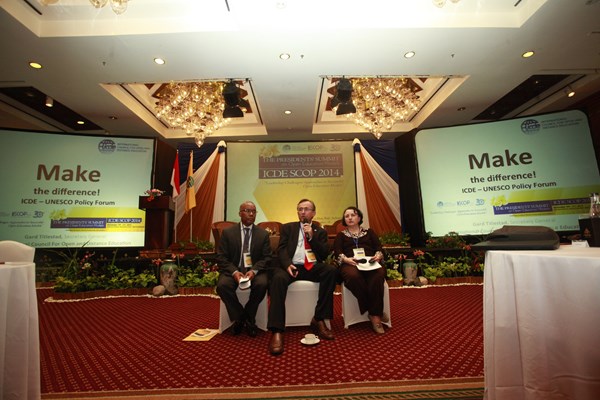Access to, and success in, open, online and flexible learning are key solutions to the pressing development challenges and needs of 21st century societies, emphasizes the November 2014 Bali Declaration by ICDE's higher education leaders
OSLO, Norway, Dec. 10, 2014 (GLOBE NEWSWIRE) -- "To tackle inequality, unemployment, in particular among youth, and progress towards the development goals of nations, a new commitment is needed to opening up education, technology enhanced learning, the use of open educational resources, online, flexible and blended learning, research and innovation in the design, development, deployment and delivery of education at all levels."
A photo accompanying this release is available at http://www.globenewswire.com/newsroom/prs/?pkgid=29548
This is the central conclusion of an ICDE - UNESCO Policy Forum in Bali, as pointed out by Professor Tian Belawati, President of the International Council for Open and Distance Education (ICDE).
Mariana Patru, the representative of UNESCO's Education Sector, agrees: "Harnessing the potential of digital technologies to foster inclusive and more relevant lifelong learning systems constitutes a policy goal for all countries worldwide. Access to, and success in Open, Online and Flexible Learning provide both good opportunities and viable solutions to the pressing development challenges and needs that 21st century societies are increasingly being confronted with."
Presidents, rectors and vice-chancellors representing a variety of higher education institutions, from campus-based universities, bi-modal universities, distance teaching universities, online and smart universities from all regions of the world, that participated in the Presidents' Summit held in Bali in November, call on ICDE and UNESCO to continue their efforts to support and encourage governments to:
- Create favorable frameworks for opening up education – making education at all levels available to all through open, online, flexible, blended and distance education.
- Stimulate the use of Open Educational Resources (OER) – publicly funded educational resources licensed to make materials needed for learners freely available to all.
- Enable learner mobility through the development of transnational qualification frameworks, which make the recognition and transfer of qualifications, course credits and learning within and between jurisdictions part of the fabric of an open, global education system.
- Encourage the adoption of quality standards, guidelines and benchmarks for open, online and distance learning to be mainstreamed into quality frameworks and protocols.
- Foster innovation in the form of new approaches to the assessment of learning outcomes, prior learning and work-based learning; new approaches to instruction, which both increase learner engagement and learning outcomes; and new ways of collaborating and connecting to learners and higher rates of student success.
- Invest in research focused on best practices in the design, development, deployment and delivery of open, online, distance and flexible education; the use of open educational resources; the mobility of learners; new business models for the operation of educational institutions; and new models of public assurance and accountability.
ICDE's higher education leaders endorse UNESCO's post-2015 Global Education Agenda, which highlights the goal to 'ensure equitable and inclusive quality education and lifelong learning for all by 2030'.
More information about the ICDE - UNESCO Policy Forum, including the full list of specific actions for governments, quality assurance agencies, higher education institutions and academic staff, is available at icde.org/Bali_Message.
For media enquiries: please contact Gard Titlestad, Secretary General of ICDE, by email to titlestad@icde.org or by calling +47 48 10 80 96.
About ICDE: The International Council for Open and Distance Education (ICDE) is the leading global membership organization for open, distance, flexible and online education, including e-learning, and draws its membership from institutions, educational authorities, commercial actors, and individuals. ICDE has consultative partner status with UNESCO and shares UNESCO's key value – the universal right to education for all. ICDE further derives its position from the unique knowledge and experience of its members throughout the world in the development and use of new methodologies and emerging technologies.
ICDE was founded in 1938 in Canada as the International Council for Correspondence Education, and today has members from over 60 countries worldwide.
ICDE's Permanent Secretariat is in Oslo, Norway, and has been hosted by this country on a permanent basis since 1988. ICDE is supported by the Norwegian Ministry of Education and Research and by membership fees.
For more information about ICDE, visit: www.icde.org.
